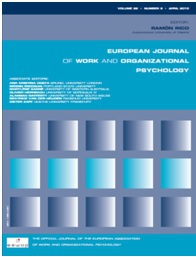EJWOP Call For Papers
02.11.2013
Call For Papers
European Journal of Work and Organizational Psychology
Special Issue: Dynamics of team adaptation and team cognition
Guest Editors
Josette M.P. Gevers , Eindhoven University of Technology, The Netherlands
Ana Margarida Passos, Instituto Universitário de Lisboa (ISCTE-IUL), Portugal
Sjir Uitdewilligen, Maastricht University, The Netherlands
Organizations are faced with unstable and dynamic environments that require continuous improvements not only in products and services but also in their overall functioning (Pulakos, Arad, Donovan, & Plamondon, 2000). As a result organizations have often reverted to team based structures for fostering the required flexibility and adaptability to deal with rapid shifts in context. Although the body of knowledge concerning factors that impact team performance has increased over the last decades (e.g. Kozlowski & Ilgen, 2006; Mathieu, Maynard, Rapp, & Gilson, 2008), relatively few studies specifically address how teams adapt to novel and challenging circumstances (LePine, 2005; Randall, Resick, & DeChurch, 2011). This is all the more critical since it is particularly during novel, non-routine situations that effective team performance becomes most crucial and at the same time most difficult to uphold (Waller, 1999). More specifically, recent theoretical work suggests that a longitudinal and integrative approach to adaptation research may help to foster an in-depth understanding of the dynamic nature of adaptive processes (Baard, Rench & Kozlowski, 2013; Burke, Stagle, Salas, Pierce, & Kendall, 2006).
Previous research suggests team cognition is quintessential to understand team adaptation (Burke et al., 2006; DeChurch & Mesmer-Magnus, 2010). However, although recent theorizing emphasizes the dynamic nature of team cognition (Rico et al., 2008; Kozlowski & Chao, 2013) empirical studies have predominantly embraced a static approach in which teams’ cognitive structures and process are operationalized as stable characteristics, and cognitive constructs as well as outcome measures are assessed at a single point in time. Yet, particularly in environments where team members have to adapt regularly to changing environmental contingencies, team cognition is likely to be characterized as an unfolding process, as teams adapt their cognitive structures to the changing demands of their task environments (Randall, Resick, & DeChurch, 2011; Uitdewilligen, Waller, & Pitariu, 2013). Moreover, although there is a general recognition in the literature of team cognition as an emergent phenomenon “by which lower level system elements interact and through those dynamics create phenomena that manifest at a higher level of the system” (Kozlowski & Chao, 2013, p. 335), still little is known about how these emergent processes unfold over time.
The purpose of this special issue therefore is to serve as a springboard for a more dynamic approach to assess team functioning in dynamic environments, and to address the dynamics of cognition in situations that require teams to adapt to unexpected changes in their task environments. A key focus of papers submitted should be the recognition of the longitudinal changing nature of team functioning including cognitive processes and structures. The concepts employed may include but are not limited to: compilation and composition emergence, flux and adaptation, non-routine events, shared cognition emergence, collective sensemaking, team reflexivity, team metacognition, and team learning.
Submissions to this special issue could cover, but are not restricted to the following topics:
-
Empirical studies as well as theories that explain the role of team cognition, team processes and emergent states in adaptive processes. For instance, papers that focus on the cognitive processes involved when teams adapt to novel circumstances or studies investigating the effects of environmental turbulence on cognitive dynamics and emergence.
-
Studies that measure team cognitive structure and processes over time in dynamic contexts. For instance by investigating the emergence of composition and compilation of team cognition over time or studies that investigate the rigidity or flexibility of team cognition. Or papers that introduce, demonstrate, or assess innovative measures, methods or techniques for assessing and analyzing team adaptation and/or team cognition over time.
-
Theoretical or empirical work that addresses specific contexts or sources of change demanding adaptation in teams, such as innovation processes in organizations, reactions to unexpected events, crisis and emergencies (medical, environmental, organizational failures), interactions between teams in multiteam systems, or organizational change processes in general.
Submission Method
Manuscripts should be submitted by Friday April 28th, 2014.
All manuscripts should be submitted through the EJWOP Scholar One Manuscripts submission site selecting ‘Team adaptation and the dynamics of team cognition’ as the Special Issue type.
Authors should adhere to the EJWOP Instructions for Authors when preparing their manuscripts. All submitted manuscripts are subject to a double blind academic review process. They will be evaluated based on their contribution to the topic and the regular EJWOP review criteria.
For further information, or if you have any questions about suitability of your work, please contact the editors:
Josette M.P. Gevers: j.m.p.gevers@tue.nl
Ana Margarida Passos: ana.passos@iscte.pt
Sjir Uitdewilligen: sjir.uitdewilligen@maastrichtuniversity.nl

